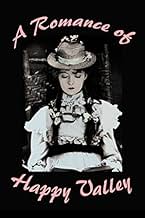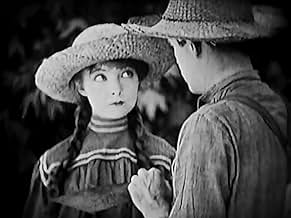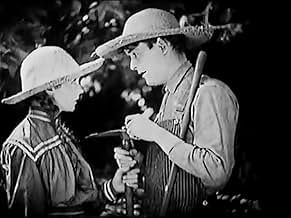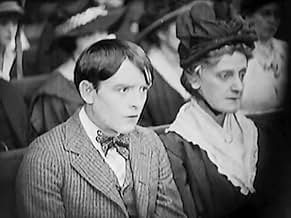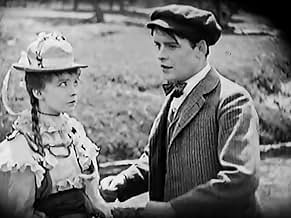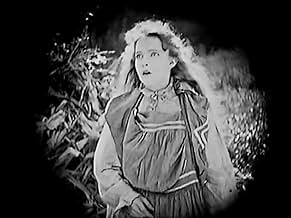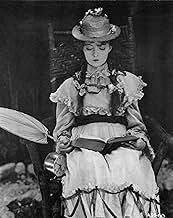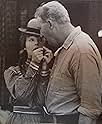Füge eine Handlung in deiner Sprache hinzuJohn Logan leaves his parents and sweetheart in bucolic Happy Valley to make his fortune in the city. Those he left behind become miserable and beleaguered in his absence, but after several ... Alles lesenJohn Logan leaves his parents and sweetheart in bucolic Happy Valley to make his fortune in the city. Those he left behind become miserable and beleaguered in his absence, but after several years he returns, a wealthy man.John Logan leaves his parents and sweetheart in bucolic Happy Valley to make his fortune in the city. Those he left behind become miserable and beleaguered in his absence, but after several years he returns, a wealthy man.
- Regie
- Drehbuch
- Hauptbesetzung
Carol Dempster
- Girl John Logan meets in New York
- (Nicht genannt)
Empfohlene Bewertungen
Romance of Happy Valley, A (1918)
** 1/2 (out of 4)
D.W. Griffith film was one of four he rushed at First National. A poor boy (Robert Harron) from Kentucky goes to NYC to make a fortune while his love (Lillian Gish) waits back at home. In a lot of ways this was a semi-bio pick about Griffith's own life as he too was a poor boy from Kentucky who went to the big city to make it rich. Like the character in the movie, Griffith at the time was breaking up with Gish in favor of Carol Dempster who has a small part in this film playing a NYC girl who tries to steal the Kentucky boy. On the whole, this film is rushed together and it really doesn't work in the end even though there's a lot to admire here. The performances by Harron and Gish are very good and the cinematography by G.W. Bitzer is also good. The story drags at even 70-minutes with a far fetched ending that borrows from Griffith's earlier film The Son's Return.
** 1/2 (out of 4)
D.W. Griffith film was one of four he rushed at First National. A poor boy (Robert Harron) from Kentucky goes to NYC to make a fortune while his love (Lillian Gish) waits back at home. In a lot of ways this was a semi-bio pick about Griffith's own life as he too was a poor boy from Kentucky who went to the big city to make it rich. Like the character in the movie, Griffith at the time was breaking up with Gish in favor of Carol Dempster who has a small part in this film playing a NYC girl who tries to steal the Kentucky boy. On the whole, this film is rushed together and it really doesn't work in the end even though there's a lot to admire here. The performances by Harron and Gish are very good and the cinematography by G.W. Bitzer is also good. The story drags at even 70-minutes with a far fetched ending that borrows from Griffith's earlier film The Son's Return.
"A Romance of Happy Valley" is a good smaller production from D.W. Griffith. It's very similar to and somewhat lesser than his later film also of the same year, "True Heart Susie". Both pictures star Lillian Gish and Robert Harron as lovers estranged for considerable length and are coming-of-age melodramas set in America's rural South. I'm not positive, but the same sets may have been used in both films; regardless, the locations are similar looking.
As in the later film, Gish plays a naïve, long-suffering country girl who awaits Harron's return from making good in the city. The narrative here isn't as well developed as that for "True Heart Susie" and, perhaps, one can view "A Romance of Happy Valley" as a bit of a trial run for the later film. The frog toy invention Harron makes good with seems as though it must be a joke I'm not getting. And, the contrived ending reused from Griffith's short film "The Son's Return" (1909) and the Judas character were unnecessary and irrelevant to the main story. A more abrupt reunion finale without the cheap surprise gimmicks would have been preferred.
Nevertheless, I like the film for its nice photography and good scene dissection between the picturesque countryside and closer views of the characters. The beauty of Bitzer's cinematography isn't as evident in the somewhat worn out print for this film as it is in the recent Film Preservation Associates restoration of "True Heart Susie" and in some of Griffith's other more prominent releases, but since "A Romance of Happy Valley" was considered lost until a print was discovered in a Soviet archive in 1971, we should, I suppose, consider ourselves fortunate. Additionally, arguably the best part of this picture, as was often the case in her films, is Lillian Gish's performance. She really makes her character appear featherbrained in this one, with her nervous skipping and wide-eyed look. The scene where she jerks her head right and left causing her hat to flip sides each time with her while she argues her need for more fashionable clothes to her father was especially amusing. And, her scenes with Harron's coat on a scarecrow rack, as a substitute for her estranged lover, are pitiful and poignant. (EDIT: It's interesting how similar this scene is to the one in "The Artist" (2011); I wonder if that's intentionally so.)
As in the later film, Gish plays a naïve, long-suffering country girl who awaits Harron's return from making good in the city. The narrative here isn't as well developed as that for "True Heart Susie" and, perhaps, one can view "A Romance of Happy Valley" as a bit of a trial run for the later film. The frog toy invention Harron makes good with seems as though it must be a joke I'm not getting. And, the contrived ending reused from Griffith's short film "The Son's Return" (1909) and the Judas character were unnecessary and irrelevant to the main story. A more abrupt reunion finale without the cheap surprise gimmicks would have been preferred.
Nevertheless, I like the film for its nice photography and good scene dissection between the picturesque countryside and closer views of the characters. The beauty of Bitzer's cinematography isn't as evident in the somewhat worn out print for this film as it is in the recent Film Preservation Associates restoration of "True Heart Susie" and in some of Griffith's other more prominent releases, but since "A Romance of Happy Valley" was considered lost until a print was discovered in a Soviet archive in 1971, we should, I suppose, consider ourselves fortunate. Additionally, arguably the best part of this picture, as was often the case in her films, is Lillian Gish's performance. She really makes her character appear featherbrained in this one, with her nervous skipping and wide-eyed look. The scene where she jerks her head right and left causing her hat to flip sides each time with her while she argues her need for more fashionable clothes to her father was especially amusing. And, her scenes with Harron's coat on a scarecrow rack, as a substitute for her estranged lover, are pitiful and poignant. (EDIT: It's interesting how similar this scene is to the one in "The Artist" (2011); I wonder if that's intentionally so.)
Some modern viewers understandably have a hard time sitting with silent films, and among other reasons, some instances especially epitomize the notion of "simpler entertainment for a simpler time." Intertitles may directly address the audience, or speak very exactly to what is happening in or represented by a scene, at the same time that the storytelling in some cases is as lighthearted as drama can be without being labeled as "comedy." Plot or character development may be very direct and uncomplicated. That's to say nothing of depiction of old-fashioned or downright antiquated values, and of culture and lifestyles far removed from our own. I think it's safe to say that all these facets are present in 'A romance of Happy Valley' in varying proportions, right down to the core of the narrative; I love the silent era, and still there are parts of this that I watch while barely suppressing derisive laughter of disbelief. Much as fantasy or science fiction may take us to an entirely different world, old titles like this might require the most robust suspension of disbelief to engage with.
Some silent movies are among the very best movies that have ever been made; others are well done and entertaining, but decidedly quaint. Given all the elements I've described, this feature is among the latter - but even at that, more than not it's a pleasure to watch, and all the more so for devotees of early cinema who recognize how such early pictures were made. The sets, costume design, and hair and makeup work are terrific, certainly helping to ease viewers into the experience. Films in the 1910s and 20s weren't necessarily known for particular nuance in the acting, but I think everyone here rather successfully imbues welcome heart and personality into their roles, letting the tableau feel meaningfully real even as other aspects might threaten our suspension of disbelief. To that point, too, while filmmaker D. W. Griffith has an asterisk or two on his legacy, there's no disputing that he was a leading icon of the industry in its earliest days, and he again proves why here with excellent, mindful direction orchestrating every shot and scene. Moreover, between Griffith's direction and the screenplay he penned with Mary Castelman, there some nicely subtle, clever inclusions that in and of themselves add much to the feature.
Mind you, for whatever value this can claim, and neverminding its idiosyncrasies, there are specific faults I would cite that weigh against it. The emphatic religious language seems very heavy-handed even for the narrative the feature has to impart. One would be remiss not to note the tawdry, tiresome use of blackface (to which Griffith was no stranger). More substantively: Among other subjective faults I would not count the tonal shift between the approximate first and second halves; on the other hand, all those factors I initially described above don't entirely hold true as the tone shifts, and that includes how intertitles are used. There comes a point when the storytelling becomes a tad muddled, and the production struggles to elucidate the precise course of events or who characters are. That goes for too much of the second half, which has fewer intertitles, choppier sequencing, and examples of emphatically weak lighting. None of this is helped by having two actors who look alike being dressed up in ways that make them even more indistinguishable from each other. While the broad story beats are clear enough, I don't believe the movie is entirely effective in communicating the movement from A to B to C, and the result feels like Movie Magic - or worse, perhaps the undeveloped storytelling of a young child ("This happened. And then this happened. The end."). If the writing of the backend were tightened, providing a more lucid narrative, the whole would have been drastically improved.
Considered overall I believe 'A romance of Happy Valley' is roughly on par with the bulk of its contemporaries - not super remarkable, but suitably well done despite glaring issues (the blackface), ham-handedness and outmoded norms, and other matters. The uneven dispensation of its storytelling is where I have the biggest problem, but then, maybe I'm being too cynical. In any event, the fact remains that when all is said and done this is surely a piece mostly likely to appeal only to those who are already enamored with the silent era, and other audience members can probably just move on. Even then there are many other titles that indisputably earn a higher priority, but if you happen to come across this one and are willing and able to parse with distinct imperfections, then it's not a bad way to spend 76 minutes.
Some silent movies are among the very best movies that have ever been made; others are well done and entertaining, but decidedly quaint. Given all the elements I've described, this feature is among the latter - but even at that, more than not it's a pleasure to watch, and all the more so for devotees of early cinema who recognize how such early pictures were made. The sets, costume design, and hair and makeup work are terrific, certainly helping to ease viewers into the experience. Films in the 1910s and 20s weren't necessarily known for particular nuance in the acting, but I think everyone here rather successfully imbues welcome heart and personality into their roles, letting the tableau feel meaningfully real even as other aspects might threaten our suspension of disbelief. To that point, too, while filmmaker D. W. Griffith has an asterisk or two on his legacy, there's no disputing that he was a leading icon of the industry in its earliest days, and he again proves why here with excellent, mindful direction orchestrating every shot and scene. Moreover, between Griffith's direction and the screenplay he penned with Mary Castelman, there some nicely subtle, clever inclusions that in and of themselves add much to the feature.
Mind you, for whatever value this can claim, and neverminding its idiosyncrasies, there are specific faults I would cite that weigh against it. The emphatic religious language seems very heavy-handed even for the narrative the feature has to impart. One would be remiss not to note the tawdry, tiresome use of blackface (to which Griffith was no stranger). More substantively: Among other subjective faults I would not count the tonal shift between the approximate first and second halves; on the other hand, all those factors I initially described above don't entirely hold true as the tone shifts, and that includes how intertitles are used. There comes a point when the storytelling becomes a tad muddled, and the production struggles to elucidate the precise course of events or who characters are. That goes for too much of the second half, which has fewer intertitles, choppier sequencing, and examples of emphatically weak lighting. None of this is helped by having two actors who look alike being dressed up in ways that make them even more indistinguishable from each other. While the broad story beats are clear enough, I don't believe the movie is entirely effective in communicating the movement from A to B to C, and the result feels like Movie Magic - or worse, perhaps the undeveloped storytelling of a young child ("This happened. And then this happened. The end."). If the writing of the backend were tightened, providing a more lucid narrative, the whole would have been drastically improved.
Considered overall I believe 'A romance of Happy Valley' is roughly on par with the bulk of its contemporaries - not super remarkable, but suitably well done despite glaring issues (the blackface), ham-handedness and outmoded norms, and other matters. The uneven dispensation of its storytelling is where I have the biggest problem, but then, maybe I'm being too cynical. In any event, the fact remains that when all is said and done this is surely a piece mostly likely to appeal only to those who are already enamored with the silent era, and other audience members can probably just move on. Even then there are many other titles that indisputably earn a higher priority, but if you happen to come across this one and are willing and able to parse with distinct imperfections, then it's not a bad way to spend 76 minutes.
Back in the early 20th century, D.W. Griffith was an innovative filmmaker. He managed to tell wonderful stories and was wildly popular through the 1910s. However, as the years passed, Griffith went from being an innovator to being very old fashioned and stodgy. It wasn't that his films had changed so much as times had changed and he hadn't kept up with them. This is strongly evident with his "A Romance of Happy Valley"—a film which worked in 1919 when it debuted but which would just seem hokey into the 1920s. This is because the film is extremely moralistic and the subtitles often come off as preachy homilies than anything else.
The story is one close to Griffith's heart. After all, like the characters in the story, he grew up in rural Kentucky and he idealized its simple way of life. Oddly, however, the film decries the evils of moving to the big city—something Griffith himself did when he packed up and moved to Los Angeles. While the city was hardly a metropolis at the time, compared to his native Kentucky, it was practically sin city! The story is about a country boy named Johnny. After hearing a New Yorker talk about how wonderful the big city is, Johnny is determined to go there and make his fortune. The problems are that Jennie (Lillian Gish) is in love with him and his parents have worked hard on the farm in order to pass it down to him. Regardless, he eventually does go to New York and soon learns about the drudgeries of city life. And, while he promised to return in one year, one year soon stretches to eight! What's to become of Jennie and Johnny's farm? If you could re-write the heavy-handed intertitle cards (which sound more like the teachings of Norman Vincent Peale than those of a filmmaker), didn't use white folks painted black* as well as NOT made all the references to Judas Iscariot for one of the characters, the film would have worked a lot better. After all, the ending is very creative and the cinematography was lovely. Worth seeing but is extremely old fashioned and is not among Griffith's better work. And, if you've seen other films like Griffith's "Home, Sweet Home" you'll see that the themes in "A Romance of Happy Valley" are often repeated in his work.
*After watching this film and other Griffith films (especially "Birth of a Nation"), I can only conclude that Griffith must have really hated black people. Again and again, instead of hiring black actors, he usually just had white guys paint themselves with burnt cork to play black parts. An enlightened guy he wasn't—and may help explain why such an important early filmmaker is all but forgotten today.
The story is one close to Griffith's heart. After all, like the characters in the story, he grew up in rural Kentucky and he idealized its simple way of life. Oddly, however, the film decries the evils of moving to the big city—something Griffith himself did when he packed up and moved to Los Angeles. While the city was hardly a metropolis at the time, compared to his native Kentucky, it was practically sin city! The story is about a country boy named Johnny. After hearing a New Yorker talk about how wonderful the big city is, Johnny is determined to go there and make his fortune. The problems are that Jennie (Lillian Gish) is in love with him and his parents have worked hard on the farm in order to pass it down to him. Regardless, he eventually does go to New York and soon learns about the drudgeries of city life. And, while he promised to return in one year, one year soon stretches to eight! What's to become of Jennie and Johnny's farm? If you could re-write the heavy-handed intertitle cards (which sound more like the teachings of Norman Vincent Peale than those of a filmmaker), didn't use white folks painted black* as well as NOT made all the references to Judas Iscariot for one of the characters, the film would have worked a lot better. After all, the ending is very creative and the cinematography was lovely. Worth seeing but is extremely old fashioned and is not among Griffith's better work. And, if you've seen other films like Griffith's "Home, Sweet Home" you'll see that the themes in "A Romance of Happy Valley" are often repeated in his work.
*After watching this film and other Griffith films (especially "Birth of a Nation"), I can only conclude that Griffith must have really hated black people. Again and again, instead of hiring black actors, he usually just had white guys paint themselves with burnt cork to play black parts. An enlightened guy he wasn't—and may help explain why such an important early filmmaker is all but forgotten today.
A ROMANCE OF HAPPY VALLEY (Famous Players, 1919), is a small production directed by a major director, D. W. Griffith, in a simple-minded story set in a the birthplace of his old Kentucky home. Featuring a cast of Griffith stock players ranging from Robert Harron, Lillian Gish, Kate Bruce and George Fawcett, this photo-play centers mostly on Harron, close to physically resembling Richard Barthelmess during his opening scenes as a hillbilly youth sporting a straw hat and overalls to his physical self during the latter half in a mature manner with mustache, sideburns, hat and suit, with Gish in pig-tales or shoulder-length hair as his loyal girlfriend.
Opening title: "What a better place for a romance than old Kentucky in the county of MAKE BELIEVE, on the pike that never was." Happy Valley, as stated, takes place in Kentucky. John L. Logan Jr. (Robert Harron) is a country boy whose parents (George Fawcett and Kate Bruce) are lifelong farmers. After meeting with Judas (Bertram Grassby), a visiting city man, Johnny yearns on departing his no-future existence by bettering himself in the big city. Jennie Timberlake (Lillian Gish), also known as "Forgetful Jennie," who lives next door with her widowed father (George Nichols), has loved Johnny since their childhood and fears of losing him if he should go. However, against his father's wishes, but the blessing from his mother, Johnny heads for New York on the next train and intends on coming home once he becomes successful. During his absence, Jennie continues to think about him, even by placing one of his old jackets onto a scarecrow in the cornfields and conversing with it during her moments of loneliness. As for Johnny, he obtains employment at the Eastern Toy Manufacturing Company, hoping to make a fortune with his invention of a swimming mechanical frog. After spending eight years perfecting this, he earns his $1,000 to return home where he finds drastic changes have occurred. Aside from finding Jennie an old maid and his parents in the process of losing their farm, he suddenly finds himself mistaken for a bank robber on the loose. The supporting players consist of Adolph Lestina (Vinegar Watkins); Porter Strong (The Negro Farmhand); and Carol Dempster (making her debut under Griffith, appearing unbilled, as a city girl).
Griffith brings forth an age taken from his own upbringing by transferring the wholesomeness of rural Kentucky to the screen, ranging from a middle-aged country woman (Lydia Yeamans Titus) smoking their pipes while sitting in rocking chairs of their front porch; community gathering together at the Locust Grove Church every Sunday; hard-working farmers knowing no other life outside their community; while little Jennie (Gish) uses the Farmer's Almanac to get the latest fashion designs to impress Johnny.
As with hundreds to thousands of silent movies distributed during this period, A ROMANCE OF HAPPY VALLEY was one of many that had been lost for many years. With the help of film historian Eileen Bowser of the Museum of Modern Art in New York City, a print was located in Russia. Aside from its limited presentations at the MOMA's film department, it finally made it to television by becoming the initial movie shown on the public broadcasting eight-week series (June-August 1978) titled "Lost and Found" (premiering June 24, 1978) hosted by Richard Schickel based on WNET, Channel 13, in New York City. After the 55-minute presentation, a ten-minute Griffith short, THE LADY AND THE MOUSE (1913), starring Lillian Gish and Lionel Barrymore followed, concluding the premiere episode with an after-film discussion between Schickel and Gish herself. By the expression on her face, she appeared surprised to hear how much Schickel enjoyed the movie, taken from perspective that it's a very old-fashioned story with limited appeal to contemporary audiences. Gish went on to discuss other lost Griffith film titles and going in depth about her leading man, Robert Harron, as being one of the few actors personally trained by Griffith himself, and how his career was cut short due to a premature accidental shooting in 1920. Out of circulation since then, HAPPY VALLEY has had its limitations on video cassette in 1997 through Critic's Choice Masterpiece/Killian Collection accompanied by a piano score. Cable television presentation includes Turner Classic Movies (TCM premiere: October 22, 2024) at 78 minutes, as opposed to its original 55-minute 1978 showing.
Not in the large-scale sense of the two-hour plus epics as Griffith's earlier features of THE BIRTH OF A NATION (1915), INTOLERANCE (1916) and HEARTS OF THE WORLD (1918), HAPPY VALLEY, resembles that of a small film based on a short story. Also credited by Griffith as its author, it's scenario simply comes close to his own heart, and it shows. This was Griffith's heritage. These were his people enacted on screen. This was his hometown of "make believe" known as Happy Valley. (**1/2)
Opening title: "What a better place for a romance than old Kentucky in the county of MAKE BELIEVE, on the pike that never was." Happy Valley, as stated, takes place in Kentucky. John L. Logan Jr. (Robert Harron) is a country boy whose parents (George Fawcett and Kate Bruce) are lifelong farmers. After meeting with Judas (Bertram Grassby), a visiting city man, Johnny yearns on departing his no-future existence by bettering himself in the big city. Jennie Timberlake (Lillian Gish), also known as "Forgetful Jennie," who lives next door with her widowed father (George Nichols), has loved Johnny since their childhood and fears of losing him if he should go. However, against his father's wishes, but the blessing from his mother, Johnny heads for New York on the next train and intends on coming home once he becomes successful. During his absence, Jennie continues to think about him, even by placing one of his old jackets onto a scarecrow in the cornfields and conversing with it during her moments of loneliness. As for Johnny, he obtains employment at the Eastern Toy Manufacturing Company, hoping to make a fortune with his invention of a swimming mechanical frog. After spending eight years perfecting this, he earns his $1,000 to return home where he finds drastic changes have occurred. Aside from finding Jennie an old maid and his parents in the process of losing their farm, he suddenly finds himself mistaken for a bank robber on the loose. The supporting players consist of Adolph Lestina (Vinegar Watkins); Porter Strong (The Negro Farmhand); and Carol Dempster (making her debut under Griffith, appearing unbilled, as a city girl).
Griffith brings forth an age taken from his own upbringing by transferring the wholesomeness of rural Kentucky to the screen, ranging from a middle-aged country woman (Lydia Yeamans Titus) smoking their pipes while sitting in rocking chairs of their front porch; community gathering together at the Locust Grove Church every Sunday; hard-working farmers knowing no other life outside their community; while little Jennie (Gish) uses the Farmer's Almanac to get the latest fashion designs to impress Johnny.
As with hundreds to thousands of silent movies distributed during this period, A ROMANCE OF HAPPY VALLEY was one of many that had been lost for many years. With the help of film historian Eileen Bowser of the Museum of Modern Art in New York City, a print was located in Russia. Aside from its limited presentations at the MOMA's film department, it finally made it to television by becoming the initial movie shown on the public broadcasting eight-week series (June-August 1978) titled "Lost and Found" (premiering June 24, 1978) hosted by Richard Schickel based on WNET, Channel 13, in New York City. After the 55-minute presentation, a ten-minute Griffith short, THE LADY AND THE MOUSE (1913), starring Lillian Gish and Lionel Barrymore followed, concluding the premiere episode with an after-film discussion between Schickel and Gish herself. By the expression on her face, she appeared surprised to hear how much Schickel enjoyed the movie, taken from perspective that it's a very old-fashioned story with limited appeal to contemporary audiences. Gish went on to discuss other lost Griffith film titles and going in depth about her leading man, Robert Harron, as being one of the few actors personally trained by Griffith himself, and how his career was cut short due to a premature accidental shooting in 1920. Out of circulation since then, HAPPY VALLEY has had its limitations on video cassette in 1997 through Critic's Choice Masterpiece/Killian Collection accompanied by a piano score. Cable television presentation includes Turner Classic Movies (TCM premiere: October 22, 2024) at 78 minutes, as opposed to its original 55-minute 1978 showing.
Not in the large-scale sense of the two-hour plus epics as Griffith's earlier features of THE BIRTH OF A NATION (1915), INTOLERANCE (1916) and HEARTS OF THE WORLD (1918), HAPPY VALLEY, resembles that of a small film based on a short story. Also credited by Griffith as its author, it's scenario simply comes close to his own heart, and it shows. This was Griffith's heritage. These were his people enacted on screen. This was his hometown of "make believe" known as Happy Valley. (**1/2)
Wusstest du schon
- WissenswertesBelieved lost for almost 50 years, a print was discovered in 1965 in the State Film Archives of the Soviet Union, which donated it to the Museum of Modern Art.
Top-Auswahl
Melde dich zum Bewerten an und greife auf die Watchlist für personalisierte Empfehlungen zu.
Details
- Erscheinungsdatum
- Herkunftsland
- Sprachen
- Auch bekannt als
- The Romance of Happy Valley
- Produktionsfirma
- Weitere beteiligte Unternehmen bei IMDbPro anzeigen
- Laufzeit1 Stunde 16 Minuten
- Farbe
- Sound-Mix
- Seitenverhältnis
- 1.33 : 1
Zu dieser Seite beitragen
Bearbeitung vorschlagen oder fehlenden Inhalt hinzufügen

Oberste Lücke
By what name was A Romance of Happy Valley (1919) officially released in India in English?
Antwort
